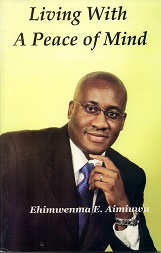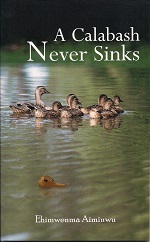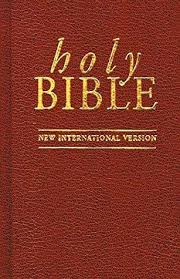Alex G. Igbineweka
Director of Edo & Guosa Languages
American Heritage University
2035 North D Street
San Bernardino, CA 92405
Cell Phone: (510) 706-5652
Phone: 909.713.0186
Toll Free: 888.484.8689
Fax: 909.886.8055
Email: president@amheritageuniv.net, guosa-language@amheritageuniv.net,
guosa-language2@aol.com
URL: www.amheritageuniv.net
© Copyright Reserved
ISBN 978-32091-2-6
PREAMBLE:
You are all welcome to TEACH YOURSELF EDO LANGUAGE, and we shall begin this course with the simple or common greetings and salutations first in Edo language and duly translated into the English language.
Before we commence, I must make this special warning that the materials contained in this lesson tape and disc must never be copied, reproduced, retrieved, transferred, or re-written in any manner without the written approval and consent of the Guosa Language Research Center, P.O. Box 2797, Richmond, CA 94802; or, Guosa Language Research Center, 647 16th Street, Unit A, Richmond, CA 94801; Telephone Area Code 510-233-9228.
Edo Language ……………………….English Language
Ób’ókhían ……………………………welcome
Ób’ówa ……………………………….greetings to you at home
Kóyo ………………………………….hello
Vbèè óye hé? ………………………How are you/how is it?
Òy’ èsé ………………………………It is fine, o.k.
Ób’ówie ……………………………..good morning
Ób’ávàn ……………………………..good afternoon
Ób’ ótà ………………………………good evening
Òkhíen òwie ………………………..until tomorrow morning/good night
Ób’íwìnà …………………………….greetings to you at work
Ù rú èsé …………………………….thank you
Ìsélógbé …………………………….complements of the seasons (end of the year/new year’s greetings)
Next in Lesson One, we shall study a little bit of the Edo language grammar as folllows:
Alphabets: Á B D É È F G Í H K L M N Ó Ò P R S T Ú V W Y Z
Note: The first letter after the consonant D, i.e. É takes the form of vowel (ÉH) while the fifth letter and vowel in the Alphabets is pronounced (EH) (mid tone) and a dot under the letter E
From the above graphic alphabets you will observe that the Edo language has no letters like “C”, “J” and “X”.
Thus you can compose some elementary words using the above Edo Alphabets and vowels, though the PC do not have all the qualities for me to properly write them in an original Edo form and version, for instance I cannot find a vowel with a dot under it in the Computer.
In the mean time:
LESSON ONE:
Edo Language ………………English Language
Kóyò ………………………….hello
Vbo yé hé(h).. ………………how is it?
òyè èsé ………………………it is fine or good
Vbè á tíe rue? ………………What are you called?
Vbè ore ‘nì rue ………………What is your name?
érhá ……………………………..father
íyé ………………………………mother
òtén…………………………… relation
òténmwén ……………………my relation
òkpia ………………………….male, man
òkhùo …………………………female, woman
Now, how can I say in Edo language:
My male relation _____________________________
My female relation _____________________________
My brother _____________________________
My sister _____________________________
Hello, my brother _____________________________
Hello, my sister _____________________________
Hello, father my father _____________________________
Hello, my mother _____________________________
LESSON TWO ENAO: (Noun):
Let us now direct our minds on the different parts of speech in the English and get the corresponding words in Edo language, beginning with the Noun; or, (NAO) in anglo-Edo phone.
TONE: ` low tone; ´ high tone; ^ hight to low tones v low to high tones; mid tone unmarked.
Edo Language :
A) Vbè áyèè è Náo kha?
1) E Náo rórè ènì óghéé òmwán komwán, èmwín kémwín, rà ehekehe. Vbèè óghéé ìgìemwìn:
2) Enì óghéé òmwán
Benjamin Imhonde
Philip Obazee
Kelvin Idehen
Hilary Evbayiro
Cynthia Enahoro
Ehimwenman Aimiuwu
Victor Uwaifo
3) Ènì óghéé èmwín kémwín:
Úkpú, Èkàlákà; Èvbèe; Àmen; Ìzènófua; Èvbàré, Íghó, Ímóto, Èzúzù, Èhóhò, Úkpó, Òwá, Èkhàrhà, Árába, Ófíugbòn, Éhén, Èmíowo, Ìyán, Òghèdè, lè’vbá gha khían.
4) Ènì óghéé èhékéhe:
Ókhúokhúo; Èkíobá, Úromì, Àgénebódè, Úbíazà, Úghéllí, Èrúa, Ígúovbíobò, Ùrhókúosà, Ìdúnmwún Ìgun, Ègùae óghé Óbá; lè’vbá sè ‘vbá.
English Translation:
A) What is a Noun?
1) Answer: Noun is a name of any person, things or places. For example
2) Personal Noun:
Benjamin Imhonde
Philip Obazee
Cynthia Enahoro
Kelvin Idehen
Ehimwenman Aimiuwu
Victor Uwaifo
3) Noun of things:
Cup, drinking glass (glass cup), Kola-nut, Water, Crayfish, Money, Motor, Fan, Air/wind, Road, Bed, Umbrella, Rubber, Oil, Fish, Meat/beef, Yam, Plantain, and so on.
4) Noun of places:
Okhuokhuo, Ekioba, Uromi, Agenebode, Ubiaza, Ughelli, Erua, Ighuovbiobo, Ùrhókúosà , Idunmwun Igun, Eguae oghe Oba, and so on.
PLEASE, SUPPORT THE EDO LANGUAGE SPREAD AND TEACHING, ORDER FOR YOUR CD AND FULL NOTES OF THE LESSON NOW FROM THE ADDRESS ABOVE.








